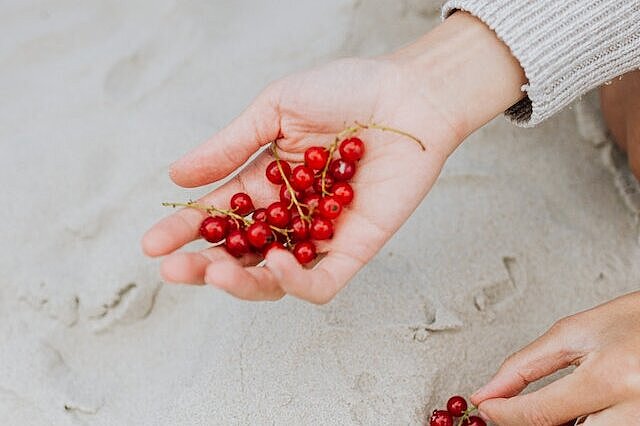Rose hips

What are rose hips?
Rosehips are the seed capsules of wild roses that ripen after flowering in the fall. They contain many small, hard seeds surrounded by soft, juicy flesh. Rosehips are rich in vitamin C, which strengthens the immune system, as well as other vitamins, minerals and plant substances that have an anti-inflammatory, antioxidant and immunomodulating effect.
What are the benefits of rosehips for dogs?
Rosehips can help dogs with various ailments, such as
- Osteoarthritis: Rosehip powder can relieve joint pain and stiffness, improve mobility and slow down cartilage degradation.
- Skin and coat problems: Rose hips can strengthen the skin barrier, reduce itching and make the coat shiny and supple.
- Gastrointestinal complaints: Rosehips can aid digestion, support intestinal flora and counteract diarrhea or constipation.
- Infections: Rosehips can strengthen a dog's immune system and protect it from bacterial, viral or parasitic pathogens.
What are the disadvantages of rosehips for dogs?
Rosehips are not toxic to dogs, but they can have some disadvantages, such as:
- Allergies: Rosehips can cause allergic reactions in some dogs, such as skin rashes, itching or breathing difficulties. When you give your dog rosehips for the first time, you should therefore look out for possible signs of intolerance.
- Seeds: Rosehip seeds are very hard and can cause irritation in the mouth or digestive tract of dogs. They can also damage teeth or lead to intestinal obstruction if swallowed in large quantities. You should therefore remove the seeds before feeding or only use rosehip powder.
- Overdosing: Rosehips are healthy, but as with everything, the dose makes the poison. If you give your dog too many rosehips, this can lead to side effects such as diarrhea, vomiting or kidney stones. You should therefore stick to the recommended dosage and ask your vet for advice if you are unsure.
How do you feed rosehips to dogs?
Rosehips can be fed to dogs in various ways, such as
- Fresh: You can give your dog fresh rosehips from the bush, but only if you are sure they are not sprayed or contaminated. You should also remove the seeds or encourage your dog to spit them out. Fresh rosehips are very acidic and can attack tooth enamel, so you should brush your dog's teeth afterwards or give him something to chew on.
- Dried: You can buy dried rosehips for your dog or make your own by cutting the fruit in half, removing the seeds and drying them at a low temperature in the oven or in the air. Dried rosehips are less acidic than fresh ones and can be given as a treat or added to food.
- Ground: You can buy rosehip powder for your dog or make your own by grinding dried rosehips in a coffee grinder or blender. Rosehip powder is very practical and can simply be sprinkled over the food or mixed with a little water.
- Brewed: You can make rosehip tea for your dog by pouring hot water over dried or ground rosehips and leaving to infuse. Rosehip tea is very refreshing and can be offered to your dog cold or lukewarm. You can also sweeten the tea with a little honey or coconut oil to improve the taste.
How to dose rosehips for dogs?
The dosage of rose hips for dogs depends on various factors, such as weight, age, health status and the type of rose hips. There is no general recommendation, so you should always follow the manufacturer's instructions or ask your vet for advice. However, you can use the following quantities as a guide:
- Fresh rosehips: 1-2 fruits per day for small dogs, 2-4 fruits per day for medium sized dogs, 4-6 fruits per day for large dogs.
- Dried rose hips: 1-2 teaspoons per day for small dogs, 2-4 teaspoons per day for medium-sized dogs, 4-6 teaspoons per day for large dogs.
- Rosehippowder: 1-2 grams per day for small dogs, 2-4 grams per day for medium-sized dogs, 4-6 grams per day for large dogs.
- Rosehiptea: 50-100 ml per day for small dogs, 100-200 ml per day for medium-sized dogs, 200-300 ml per day for large dogs.
Rosehips are a natural and healthy supplement for your dog that can help him with many ailments. You can offer him rosehips in various forms, depending on what he likes best.
However, you should always make sure that you give the correct dosage and do not feed any seeds.
Properties 4
Are you looking for other ingredients with a specific property?
Just click on them to find more.
If you notice any signs of hypersensitivity or poisoning in your dog, you should see your vet immediately. We are not a substitute for a vet, but we try to be as accurate as possible. Every dog reacts differently and we recommend you get a second opinion or consult your vet if in doubt.
Stay healthy and take good care of your four-legged friend!😊
Similar to Rose hips
The short answer is unfortunately no: elderberries are not safe for dogs. This is because the seeds contain a hydrocyanic acid glycoside called sambunigrin, which is poisonous to dogs. In addition,...
Currants are the only genus in the gooseberry family. There are different types of currants, which differ in color, taste and nutritional content. The best known are the red, white and black...
Blackberries are berry fruits that belong to the rose family. They grow on thorny bushes, which can often be found on forest edges, hedges or fences. The fruits are black or dark purple when ripe...
Raspberries are berry fruits that belong to the rose family. They grow on bushes that can grow up to two meters high. The fruits consist of many small individual fruits, which together have a...



